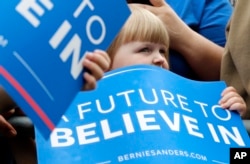It wasn't that long ago that the political rise of billionaire Donald Trump prompted predictions of a Republican Party implosion. Certainly the party of Lincoln and Reagan would not hand over the reins of leadership to a former reality TV star with a penchant for self-promotion and social media insults?
Well, the Republicans seem to be moving past their crisis point. But in an unexpected twist, it's now the Democratic Party that is being forced to come to grips with the fallout from a divisive primary battle. And how the party deals with these tensions could go a long way toward determining whether Democrats will be able to hold the presidency for a third consecutive term beginning in 2017.
Tensions rising
Democratic presidential front-runner Hillary Clinton claimed a narrow victory in Tuesday's Kentucky primary, even as rival Bernie Sanders continued his winning ways with a victory in Oregon.
Clinton remains on track to clinch the Democratic Party's presidential nomination, perhaps as early as June 7. But Sanders has given no sign of giving up, and tensions between the two campaigns are on the rise, raising fears among some Democrats that the party will have a difficult time unifying to face Trump, the presumptive Republican nominee.
Clinton and Sanders effectively split the delegate count from the contests in Kentucky and Oregon, and that did little to change the overall trajectory of the race. Clinton leads Sanders in the delegate count by a wide enough margin that the only way the Vermont senator could catch her is by winning the remaining primaries by huge margins, and by forcing defections of super-delegates who currently support Clinton. Both are far-fetched at this point.
Venting frustration
But Sanders made it clear at a rally Tuesday night in Carson, California, that he is not giving up.
"It will be a steep climb. I recognize that,” he said. “But we have the possibility of going to Philadelphia with a majority of the pledged delegates."
Sanders also said the Democratic Party needs to be more welcoming to his supporters who "are prepared to fight for real economic and social change." And he warned that it would be "a very sad and tragic option" for the party to maintain the status quo.
Tensions between the two campaigns were on display at a recent Democratic state convention in Nevada, when Sanders supporters vented their frustration at party officials over the process of selecting delegates to attend the Democratic National Convention in Philadelphia in July.
Some Sanders activists threw chairs, and later some threats were made toward state party chairwoman Roberta Lange.
Philadelphia convention
Some Democrats worry the simmering tensions over the primary battle could lead to problems at the July convention.
Senate Democratic leader Harry Reid urged Sanders to show leadership in calming his supporters.
Sanders issued a statement that "condemned all forms of violence," but noted that there have been no incidents at his rallies around the country.
In her recent campaign rallies, Clinton has been eager to turn her focus to Trump.
"He can say whatever he wants to say about me personally,” she told supporters in Kentucky. “I will stand up and fight for and speak out for every American that he attacks and he insults!"
Late victories
But Sanders' ability to draw large crowds of intense supporters and win primaries acts as a brake on Clinton's efforts to move past the divisive primary campaign and shift her focus to Trump.
Sanders' success in later primaries has historical precedent, according to analyst William Galston at the Brookings Institution in Washington.
"Late victories by the losers are not at all unusual. We saw much the same thing, actually, in 1992 when Bill Clinton was vying for and ultimately claiming the Democratic Party nomination," Galston said.
He added that the current Democratic fissures pale in comparison with the first election he followed closely: the 1968 campaign when the Democratic Party came apart at the seams.
Looking for leverage
Sanders' continued success in the primaries and his ability to draw supporters could give him valuable political leverage at the national convention in Philadelphia.
"His goal at this point is obviously to influence the platform, influence Hillary Clinton and try to continue to keep her to the left," said Roll Call Editor Melinda Henneberger.
But eventually, Galston predicts, Sanders will have to take steps to unify the party behind Clinton to take on Trump.
"She has some work to do, but so does Senator Sanders,” he said. “And I would say that the principal responsibility for bringing his supporters on board rests with him, not her."
At times, Sanders has indicated he would be willing to do so.
"While we may have many disagreements with Secretary Clinton, there is one area we agree, and that is we must defeat Donald Trump!" Sanders told supporters during a recent rally in Oregon.
Path to unity
In the end, despite the recent acrimony, many analysts expect that Democrats will be able to work out their differences and unite behind Clinton during and after the convention.
"I think the Bernie Sanders supporters will come home to Hillary Clinton," said John Fortier of the Bipartisan Policy Center. "It may take a month after the convention when they say, what's the alternative — Hillary Clinton or a Republican that is much further from our views?"
But getting to that point is a few months away, and the weeks ahead are likely to challenge the unifying skills of both Clinton and Sanders.
The early signs are that getting the Democrats to unify may take a lot more skill and political gamesmanship than anyone could have predicted a year ago.









